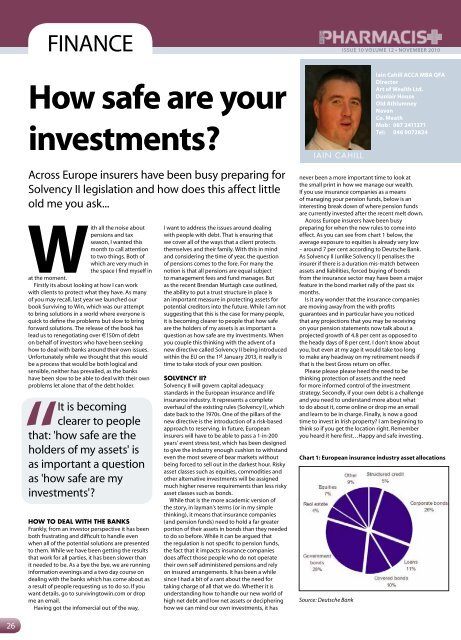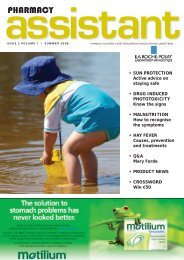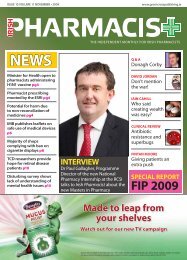inTervieW - Green Cross Publishing
inTervieW - Green Cross Publishing
inTervieW - Green Cross Publishing
You also want an ePaper? Increase the reach of your titles
YUMPU automatically turns print PDFs into web optimized ePapers that Google loves.
26<br />
finance<br />
How safe are your<br />
investments?<br />
Across Europe insurers have been busy preparing for<br />
Solvency II legislation and how does this affect little<br />
old me you ask...<br />
With all the noise about<br />
pensions and tax<br />
season, I wanted this<br />
month to call attention<br />
to two things. Both of<br />
which are very much in<br />
the space I find myself in<br />
at the moment.<br />
Firstly its about looking at how I can work<br />
with clients to protect what they have. As many<br />
of you may recall, last year we launched our<br />
book Surviving to Win, which was our attempt<br />
to bring solutions in a world where everyone is<br />
quick to define the problems but slow to bring<br />
forward solutions. The release of the book has<br />
lead us to renegotiating over €150m of debt<br />
on behalf of investors who have been seeking<br />
how to deal with banks around their own issues.<br />
Unfortunately while we thought that this would<br />
be a process that would be both logical and<br />
sensible, neither has prevailed, as the banks<br />
have been slow to be able to deal with their own<br />
problems let alone that of the debt holder.<br />
“<br />
It is becoming<br />
clearer to people<br />
that: 'how safe are the<br />
holders of my assets' is<br />
as important a question<br />
as 'how safe are my<br />
investments'?<br />
how To deal wiTh The Banks<br />
Frankly, from an investor perspective it has been<br />
both frustrating and difficult to handle even<br />
when all of the potential solutions are presented<br />
to them. While we have been getting the results<br />
that work for all parties, it has been slower than<br />
it needed to be. As a bye the bye, we are running<br />
information evenings and a two day course on<br />
dealing with the banks which has come about as<br />
a result of people requesting us to do so. If you<br />
want details, go to survivingtowin.com or drop<br />
me an email.<br />
Having got the infomercial out of the way,<br />
I want to address the issues around dealing<br />
with people with debt. That is ensuring that<br />
we cover all of the ways that a client protects<br />
themselves and their family. With this in mind<br />
and considering the time of year, the question<br />
of pensions comes to the fore. For many the<br />
notion is that all pensions are equal subject<br />
to management fees and fund manager. But<br />
as the recent Brendan Murtagh case outlined,<br />
the ability to put a trust structure in place is<br />
an important measure in protecting assets for<br />
potential creditors into the future. While I am not<br />
suggesting that this is the case for many people,<br />
it is becoming clearer to people that how safe<br />
are the holders of my assets is as important a<br />
question as how safe are my investments. When<br />
you couple this thinking with the advent of a<br />
new directive called Solvency II being introduced<br />
within the EU on the 1st January 2013, it really is<br />
time to take stock of your own position.<br />
solvency ii?<br />
Solvency II will govern capital adequacy<br />
standards in the European insurance and life<br />
insurance industry. It represents a complete<br />
overhaul of the existing rules (Solvency I), which<br />
date back to the 1970s. One of the pillars of the<br />
new directive is the introduction of a risk-based<br />
approach to reserving. In future, European<br />
insurers will have to be able to pass a 1-in-200<br />
years’ event stress test, which has been designed<br />
to give the industry enough cushion to withstand<br />
even the most severe of bear markets without<br />
being forced to sell out in the darkest hour. Risky<br />
asset classes such as equities, commodities and<br />
other alternative investments will be assigned<br />
much higher reserve requirements than less risky<br />
asset classes such as bonds.<br />
While that is the more academic version of<br />
the story, in layman’s terms (or in my simple<br />
thinking), it means that insurance companies<br />
(and pension funds) need to hold a far greater<br />
portion of their assets in bonds than they needed<br />
to do so before. While it can be argued that<br />
the regulation is not specific to pension funds,<br />
the fact that it impacts insurance companies<br />
does affect those people who do not operate<br />
their own self administered pensions and rely<br />
on insured arrangements. It has been a while<br />
since I had a bit of a rant about the need for<br />
taking charge of all that we do. Whether it is<br />
understanding how to handle our new world of<br />
high net debt and low net assets or deciphering<br />
how we can mind our own investments, it has<br />
IAIN CAHIll<br />
issue 10 volume 12 • novemBeR 2010<br />
iain Cahill aCCa Mba QFa<br />
Director<br />
art of Wealth Ltd.<br />
Dunlair House<br />
old athlumney<br />
navan<br />
Co. Meath<br />
Mob: 087 2411371<br />
Tel: 046 9072824<br />
never been a more important time to look at<br />
the small print in how we manage our wealth.<br />
If you use insurance companies as a means<br />
of managing your pension funds, below is an<br />
interesting break down of where pension funds<br />
are currently invested after the recent melt down.<br />
Across Europe insurers have been busy<br />
preparing for when the new rules to come into<br />
effect. As you can see from chart 1 below, the<br />
average exposure to equities is already very low<br />
– around 7 per cent according to Deutsche Bank.<br />
As Solvency II (unlike Solvency I) penalises the<br />
insurer if there is a duration mis-match between<br />
assets and liabilities, forced buying of bonds<br />
from the insurance sector may have been a major<br />
feature in the bond market rally of the past six<br />
months.<br />
Is it any wonder that the insurance companies<br />
are moving away from the with profits<br />
guarantees and in particular have you noticed<br />
that any projections that you may be receiving<br />
on your pension statements now talk about a<br />
projected growth of 4.8 per cent as opposed to<br />
the heady days of 8 per cent. I don’t know about<br />
you, but even at my age it would take too long<br />
to make any headway on my retirement needs if<br />
that is the best Gross return on offer.<br />
Please please please heed the need to be<br />
thinking protection of assets and the need<br />
for more informed control of the investment<br />
strategy. Secondly, if your own debt is a challenge<br />
and you need to understand more about what<br />
to do about it, come online or drop me an email<br />
and learn to be in charge. Finally, is now a good<br />
time to invest in Irish property? I am beginning to<br />
think so if you get the location right. Remember<br />
you heard it here first…Happy and safe investing.<br />
Chart 1: european insurance industry asset allocations<br />
Source: Deutsche Bank










